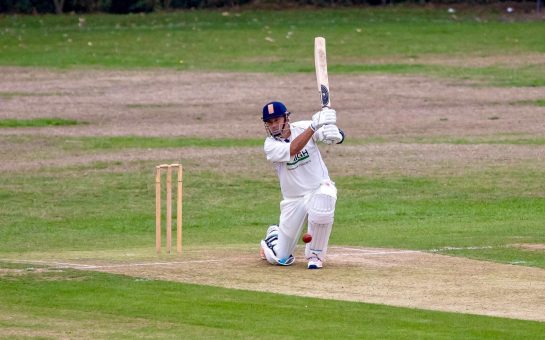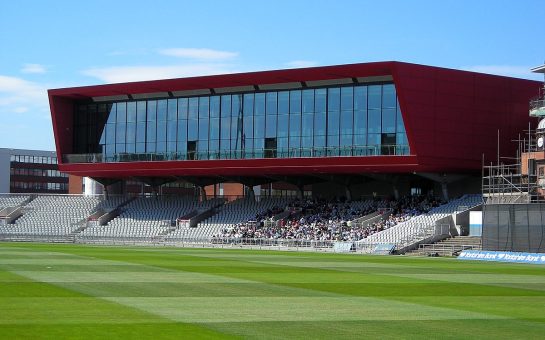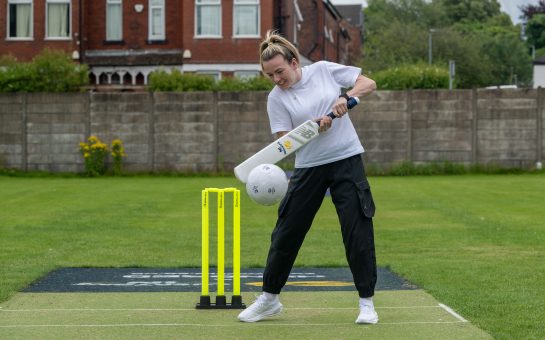If you ever needed reminding how strong Michael Atherton’s Mancunian roots are just mention the weather.
Speaking at the opening of the opening of Manchester Grammar School’s brand-spanking new indoor sports facility, it’s obvious from Atherton’s demeanour that he is more than keen to maintain the links to the places that moulded him into the man who became England captain at the age of just 25.
Atherton, the seventh-highest run-scorer in the country’s history who made 40 first-class centuries for Lancashire and 16 test tons for England, chuckles at the assertion that the new facility had to be of the indoors variety because of the classically dreary Manchester weather.
“Well, it’s a cold day today, and obviously cricket – you can’t play outside in the winter,” he says.
“You probably can’t play outside for about seven months of the year so it’s great to have an indoor facility which enables you to work on your skills all year round and improve, hopefully.”
The building – gleaming and kitted-out with brand-new basketball hoops, cricket nets, and equipment for countless other sports – was opened after damage to the previous sports hall following a bout of extreme weather in 2014.
The Michael Atherton Sports Hall now stands in its place: a two-storey facility boasting four cricket nets, an indoor hockey pitch, basketball court, five-a-side football pitch, volleyball court and six badminton courts with meeting rooms upstairs to boot.
“We didn’t have anything like this,” Atherton reminisces.
“The facilities were good, obviously, by the standards of the day, but we’re talking 30 years ago now.
“A lot of the memories are about sport, really, we had a really great football team, a great cricket team: obviously it’s quite an academic school but sport was very important and it’s great to come back and open a facility like this.
“I very much enjoyed my time at MGS and I’m proud to have been asked to come back and officially open the sports hall which will be used by the school for generations to come.”
Precociously gifted, Atherton scored almost 3,500 runs and took 170 wickets during his seven years at The Manchester Grammar School between 1979 and 1986, during which he also captained the team.
The new hall will ensure that plenty more talented sportsmen are sure to be nurtured effectively assures the school’s high master Dr. Martin Boulton.
“The new sports hall has state-of-the-art facilities, which will strengthen and enhance our reputation for providing boys, like Michael Atherton, the opportunity to develop their sporting skills and pursue careers on the national stage.”
In a day and age when physical fitness is increasingly under the microscope, Atherton was unequivocal in his commendation of the role sport has to play in a healthy upbringing.
“The great thing, I think, was just the space: the sports fields, the fixture lists, the ability to play every Saturday, a lot of Wednesdays: sport was integral to the school, so it’s a really important thing.
“I remember playing Bolton School at football every year, and [it was] a tough fixture.
“We had a football team that went for six years unbeaten and we lost one cricket match in the five years that I played in the first eleven so we had terrific teams here, great teachers who gave their time, and good players.
“And not just cricket, but all the indoor sports that this will cater for: basketball, badminton, table tennis, whatever it is, so it’s a terrific facility.”
But while the end game for many of those participating in sport in the new hall will be enjoyment and fitness, for the elite few, the combination of high-calibre coaching, impeccable facilities, and valuable opportunities could see plenty more emerge from the MGS and represent both the county and the country.
“There are two things, I think. One is that not everybody will do that, but that’s not that important thing,” Atherton says.
“I think just the ability to play, take up the sport, try and improve, and just the ability to enjoy the sport is important.
“But then if you do have people who’ve got the potential to go on and play at the highest level then obviously offering them facilities and good coaches is a critical part of that.
“But it’s not the main thing. The main thing is to give the opportunity to as many people as possible to play the game.”
With pristine equipment and provisions on offer, there is no getting around the privilege afforded to pupils at Manchester Grammar School, and it is no secret that such lofty standards are simply not there in countless other state schools scattered across Manchester and Lancashire.
And with the disparity between England cricketers coming from state schools and private schools failing to even out, the question of whether more students from less affluent backgrounds should be granted access to such facilities in order to improve is a pressing one.
“That’s a good question,” Atherton responds. “It’s not a straightforward question – what would you say Joe Root is, private or publically educated?
“He’s a bit of both, he went to a state school up to his GCSEs and then he was taken on a sports scholarship to Worksop College after that so do you count him as a statistic for the private education sector or do you count him as a statistic for the state school sector?”



